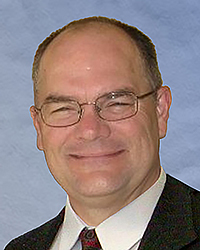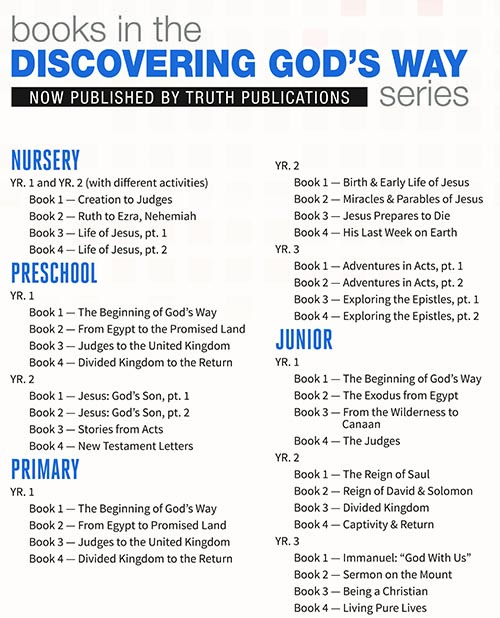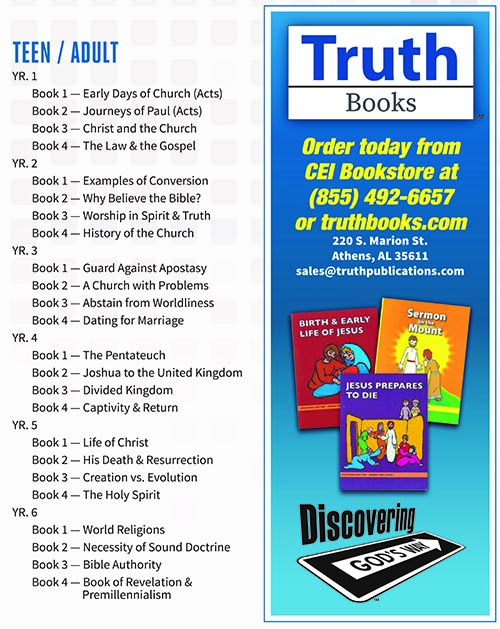

by Kyle Pope
Synopsis: The theme section of the January issue of Truth Magazine offers several reviews and personal reflections on the 2017 Exploring Current Issues Conference (ECIC). This is a private Bible study hosted by Jim Deason that has been conducted in Cullman, AL since 2011. This year's study focused upon the similarities and differences between institutional and non-institutional churches of Christ.
For a number of years, brother Jim Deason has hosted a preachers' study in Cullman, Alabama called the ECI Conference. ECI stands for "Exploring Current Issues." Although these studies are not public, audio and PowerPoint files are posted online at eciconference.com, and in a few instances, books have been published from the lectures presented. In October of 2016, I participated in that year's study on Calvinism. During our two-days together, Jim announced that the study for 2017 would be a little different. A few months earlier Jim and some other non-institutional preachers had been invited to the offices of the Gospel Advocate to visit with Greg Tidwell, the current editor of the magazine. Brother Tidwell told these men that the paper would now be open to them to submit articles for publication. From a historical standpoint, that was quite remarkable. Gospel Advocate is the longest running religious journal written by members of churches of Christ in the United States. In the heated battles over institutionalism in the 1950s and 60s, one of its former editors, B. C. Goodpasture instituted (what he called) a "yellow tag of quarantine" banning any preacher who took a non-institutional position from writing in the paper. At the same time, he began (what some brethren have called) a "confessional column" allowing preachers who once took a non-institutional position, but then changed their minds, to explain why they changed. Some believe that action (perhaps more than any other) crystallized the division between brethren over these issues. The meeting at the offices of the Advocate in mid-2016 set the stage for a different kind of study at the ECI Conference in 2017. Jim announced that it would involve preachers on both sides of the questions regarding institutionalism presenting their understanding of these issues, with the opportunity for discussion after each topic was presented.
From the moment Jim announced this I was intrigued. I came out of an institutional background and have family on both sides of these issues. When I first began to preach, the Arlington Meeting, a book recording the lectures presented at a similar discussion in Arlington, Texas in the 1968, was very instrumental in helping me understand these issues. Jim and I began corresponding about this, and I was honored when he asked me to present a lecture on the topic of "Church Government and Cooperation." Jim and Greg worked together to select speakers and choose men to participate in the discussion. The goal was to ensure that a full consideration of the issues could take place in a constructive and brotherly atmosphere. Manuscripts were submitted. Invitations were made and accepted, and the stage was set for three days of in-depth consideration of what the Bible teaches on these important issues.
The study took place on October 2-4, 2017. I will leave it to others to analyze any of the specifics of the discussion. The audio files are online, and a book was published entitled, Pursuing the Pattern: A Careful Examination of New Testament Practices. Ed. Jim Deason. The book is available through CEIbooks.com. (Editor's note: For purchase information, click here and here.) Allow me to offer just a few reflections on what this experience was, and what it was not:
The Bible affirms the autonomy of local churches (Acts 20:28) and the absolute Headship of Christ (Eph. 1:22). The efforts throughout church history by which councils and conventions presumed to dictate local church behavior were done without Scriptural authority. The study in Cullman was simply Christians coming together to discuss God's word. The only effect this may have on local churches is in the degree to which the preachers who participated carry back to their congregations things they learned at the study (cf. 2 Tim. 2:2).
Paul urged Christians in the divided church in Corinth to "be perfectly joined together in the same mind and in the same judgment" (1 Cor. 1:10, NKJV). When meetings such as this occur, the fear is that the desire we have for unity may overwhelm our commitment to uphold sound doctrine. History has shown times when truth has been compromised in a desire to heal divisions. During our three days of study I can affirm that this was not the case. In a spirit of respect and conviction, all who participated stood firmly for what they believed the Bible to teach. In some cases, misunderstandings were clarified. In other cases, differences were carefully distinguished. At no time, however, was there ever expressed the slightest willingness to ignore the teaching of Scripture for the sake of a false unity.
When Paul came to Berea, the people there were praised because, as Paul taught them about Jesus, they, "searched the Scriptures daily to find out whether these things were so" (Acts 17:11). When I was among institutional brethren, it was my experience these issues were seldom (if ever) discussed. If it had not been for my family who had connections with non-institutional brethren, I never would have even considered these questions. It is always good when people are willing to sit down and study God's word. For three days in Cullman, brethren who otherwise might never have even met had the occasion to hear some things they had not before, and consider Scripture in some ways they had not before. That was a good thing!
Paul taught, "Be kindly affectionate to one another with brotherly love, in honor giving preference to one another" (Rom. 12:10). While some so-called "progressive" members of churches of Christ have gone so far as to reject that Christ is the only way to salvation (cf. Acts 4:12), that was not true of the institutional brethren who met during this meeting. These were all men who have been baptized into Christ for the remission of sins (cf. Acts 2:38; Matt. 28:19-20). That means that, despite their participation in (what we believe to be) unauthorized practices, they are our brethren nonetheless (cf. 2 Thess. 3:15). Before the meeting, I was not sure how this would play out. Would kindness and brotherly love prevail, or would things erupt into harsh words, and bitter attitudes? To my delight a spirit of kindness and love (even while passionately expressing convictions) prevailed.
Paul prayed of the Romans, "Now may the God of patience and comfort grant you to be like-minded toward one another, according to Christ Jesus, that you may with one mind and one mouth glorify the God and Father of our Lord Jesus Christ" (Rom. 15:5-6). A good mix of older, younger, and middle-aged men were selected, not only to present lectures, but to participate in the study. This had a remarkable effect. Particularly on the non-institutional side (for which I was one of the speakers), in both the presentations and discussions, men of different backgrounds and temperaments, all spoke with "one mind and one mouth." What a wonderful reflection this is of the power of God's word to guide and direct hearts who are willing to yield to its direction.
Author-Bio: Kyle Pope preaches for the Olsen Park church of Christ in Amarillo, Texas. He has written several books published by Truth Publications including How We Got the Bible. The church website is olsenpark.com. He can be reached at kmpope@att.net.

